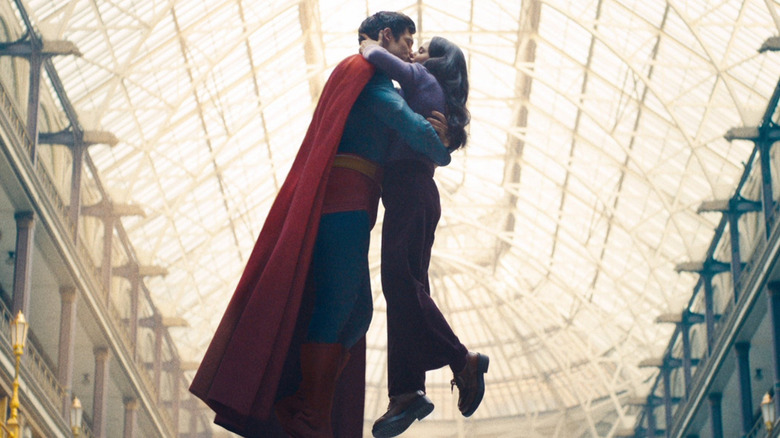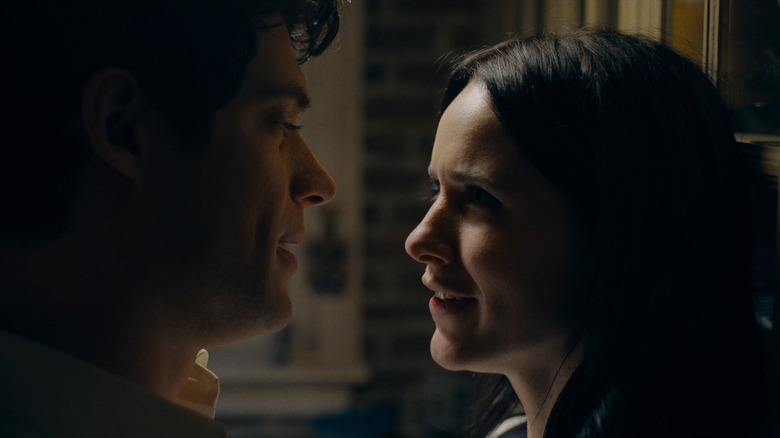James Gunn's Superman Movie Had Two Major Scenes Banned In India – Here's Why
Director James Gunn's "Superman" hit theaters over the weekend, and after literally years of waiting, the new DC Universe is officially upon us. The film introduces us to David Corenswet as Superman/Clark Kent, with Rachel Brosnahan on board as Lois Lane, making up a new interpretation of one of the greatest romances in comic book history. But it turns out that viewers in India aren't exactly getting the filmmaker's full vision of that romance, as it has been censored in the country.
As reported by Variety, the Central Board of Film Certification (CBFC) in India removed two kiss scenes from "Superman." One of them was a 33-second mid-air kiss which was teased somewhat heavily in the marketing. As for why they were removed? The CBFC deemed them to be "overly sensual," apparently. In order to achieve a UA (13+) rating, those kisses were taken out of the movie.
"Superman" was a major hit at the box office all over the world on opening weekend, so whatever had to be done to get it into theaters globally, Warner Bros. is probably happy with. That said, the decision has come under fire a bit. As Anmol Jamwal suggested on Twitter, Indian censorship can seem a little inconsistent, saying the following:
"You can have lewd double meaning jokes in Housefull 5. Beheadings & gory violence in Jaat. But....Superman kissing Lois Lane is where we draw the line."
"Housefull 5" and "Jaat" are Indian productions. What Jamwal seems to be suggesting is that the CBFC is harder on films from the United States than on films that originate in India. As of this writing, neither the CBFC or Warner Bros. have commented on the matter. Nor has Gunn, who is rather active on social media and tends to address anything that reaches a certain noise level.
Movie ratings vary from country to country, which was a problem for Superman
In fairness, censorship and controversy tend to go hand in hand. It's only become more of a hot-button issue in recent years as the global theatrical marketplace has become increasingly important for Hollywood blockbusters. At one point, studios came under fire for so-called "self-censorship" in order for certain movies to secure releases in China and elsewhere. Things have changed in the pandemic era, with China specifically increasingly favoring homegrown titles.
The larger issue is that studios like Warner Bros. need robust overseas box office returns to justify the more than $200 million budget for "Superman" and other similar blockbusters. India is a massive market, and taking a stand against this censorship would cost the studio millions. It's a business decision that a company of that size is likely going to make.
The larger issue is that other countries all around the world all have different ways of classifying movies. Italy abolished film censorship entirely in 2021, but that's a rare case. The G through NC-17 ratings system that is used in the U.S. isn't used elsewhere in the world, so a big movie like this has to pass through various censorship boards, with various adjustments sometimes required in various countries. It's just the nature of the beast.
That said, not all censorship is created equal. The controversy over the lesbian kiss in Pixar's "Lightyear" was particularly messy. This is far from the first time such a thing has come up and it certainly won't be the last, unfortunately. But this one seems to be drawing enough attention that Warner Bros., Gunn, and/or the CBFC will likely comment on it further before all's said and done.
"Superman" is in theaters now.

